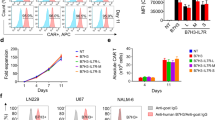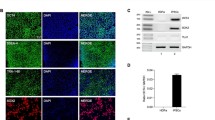Abstract
The chemokine receptor CXCR4 functions as human immunodeficiency virus (HIV)-1 coreceptor and is involved in acquired immunodeficiency virus (AIDS) neuropathogenesis. CXCR4 is expressed by most cell types in the brain, including microglia, astrocytes, and neurons. Studies have shown that the HIV envelope protein gp120 binds to neuronal CXCR4 and activates signal transduction pathways leading to apoptosis. However, the natural CXCR4 ligand (CXCL12) has been referred to induce both neuronal survival and death. Here the authors used flow cytometry to determine whether gp120 and CXCL12 differ in their ability to induce CXCR4 internalization in the human neuroblastoma cells SH-SY5Y, which constitutively express CXCR4. As expected, increasing concentration of CXCL12 reduced surface expression of CXCR4 in a time- and concentration-dependent manner. Conversely, gp120IIIB (monomeric or oligomeric, in presence or absence of soluble CD4) did not change CXCR4 membrane levels. Similar results were obtained in a murine lymphocyte cell line (300-19) stably expressing human CXCR4. Nevertheless, gp120IIIB was still able to activate intracellular signaling and proapoptotic pathways, via CXCR4. These results show that gp120IIIB toxicity and signaling do not require CXCR4 internalization in SH-SY5Y cells, and suggest that the viral protein may alter normal CXCR4 trafficking thus, interfering with activation of prosurvival pathways.
Similar content being viewed by others
Abbreviations
- HIV:
-
Human Immunodeficiency Virus
- AIDS:
-
acquired immune deficiency syndrome
- gp120:
-
glycoprotein 120KDa
- GPCRs:
-
G protein-coupled receptors
- PI3K:
-
phosphoinositide-3 kinase
- AKT:
-
serine/threonine kinase AKT/PKB
- ERK:
-
extracellular signal-regulated kinase
References
Aiuti A, Turchetto L, Cota M, Cipponi A, Brambilla A, Arcelloni C, Paroni R, Vicenzi E, Bordignon C, Poli G (1999). Human CD34(+) cells express CXCR4 and its ligand stromal cell-derived factor-1. Implications for infection by T-cell tropic human immunodeficiency virus. Blood 94: 62–73.
Bachis A, Major EO, Mocchetti I (2003). Brain-derived neurotrophic factor inhibits human immunodeficiency virus-1/gp120-mediated cerebellar granule cell death by preventing gp120 internalization. J Neurosci 23: 5715–5722.
Bachis A, Mocchetti I (2004). The chemokine receptor CXCR4 and not the N-methyl-D-aspartate receptor mediates gp120 neurotoxicity in cerebellar granule cells. J Neurosci Res 75: 75–82.
Badr G, Borhis G, Treton D, Moog C, Garraud O, Richard Y (2005). HIV type 1 glycoprotein 120 inhibits human B cell chemotaxis to CXC chemokine ligand (CXCL) 12, CC chemokine ligand (CCL)20, and CCL21. J Immunol 175: 302–310.
Baribaud F, Edwards TG, Sharron M, Brelot A, Heveker N, Price K, Mortari F, Alizon M, Tsang M, Doms RW (2001). Antigenically distinct conformations of CXCR4. J Virol 75: 8957–8967.
Bodner A, Toth PT, Oh SB, Lu M, Tran PB, Chin RK, Ren D, Miller RJ (2003). CD4 dependence of gp120IIIB-CXCR4 interaction is cell-type specific. J Neuroimmunol 140: 1–12.
Catani MV, Corasaniti MT, Navarra M, Nistico G, Finazzi-Agro A, Melino G (2000). gp 120 induces cell death in human neuroblastoma cells through the CXCR4 and CCR5 chemokine receptors. J Neurochem 74: 2373–2379.
Chalasani SH, Baribaud F, Coughlan CM, Sunshine MJ, Lee VM, Doms RW, Littman DR, Raper JA (2003). The chemokine stromal cell-derived factor-1 promotes the survival of embryonic retinal ganglion cells. J Neurosci 23: 4601–4612.
Cook DG, Fantini J, Spitalnik SL, Gonzalez-Scarano F (1994). Binding of human immunodeficiency virus type I (HIV-1) gp120 to galactosylceramide (GalCer): relationship to the V3 loop. Virology 201: 206–214.
Ferguson SS (2001). Evolving concepts in G protein-coupled receptor endocytosis: the role in receptor desensitization and signaling. Pharmacol Rev 53: 1–24.
Fernandis AZ, Cherla RP, Chernock RD, Ganju RK (2002). CXCR4/CCR5 down-modulation and chemotaxis are regulated by the proteasome pathway. J Biol Chem 277: 18111–18117.
Fernandis AZ, Cherla RP, Ganju RK (2003). Differential regulation of CXCR4-mediated T-cell chemotaxis and mitogen-activated protein kinase activation by the membrane tyrosine phosphatase, CD45. J Biol Chem 278: 9536–9543.
Garden GA, Budd SL, Tsai E, Hanson L, Kaul M, D’Emilia DM, Friedlander RM, Yuan J, Masliah E, Lipton SA (2002). Caspase cascades in human immunodeficiency virus-associated neurodegeneration. J Neurosci 22: 4015–4024.
Goel R, Baldassare JJ (2002). beta-Arrestin 1 couples thrombin to the rapid activation of the Akt pathway. Ann N Y Acad Sci 973: 138–141.
Goel R, Phillips-Mason PJ, Raben DM, Baldassare JJ (2002). alpha-Thrombin induces rapid and sustained Akt phosphorylation by beta-arrestin1-dependent and -independent mechanisms, and only the sustained Akt phosphorylation is essential for G1 phase progression. J Biol Chem 277: 18640–18648.
Hesselgesser J, Halks-Miller M, DelVecchio V, Peiper SC, Hoxie J, Kolson DL, Taub D, Horuk R (1997). CD4-independent association between HIV-1 gp120 and CXCR4: functional chemokine receptors are expressed in human neurons. Curr Biol 7: 112–121.
Hesselgesser J, Taub D, Baskar P, Greenberg M, Hoxie J, Kolson DL, Horuk R (1998). Neuronal apoptosis induced by HIV-1 gp120 and the chemokine SDF-1 alpha is mediated by the chemokine receptor CXCR4. Curr Biol 8: 595–598.
Kaul M, Garden GA, Lipton SA (2001). Pathways to neuronal injury and apoptosis in HIV-associated dementia. Nature 410: 988–994.
Kaul M, Lipton SA (1999). Chemokines and activated macrophages in HIV gp120-induced neuronal apoptosis. Proc Natl Acad Sci U S A 96: 8212–8216.
Khan MZ, Brandimarti R, Musser BJ, Resue DM, Fatatis A, Meucci O (2003). The chemokine receptor CXCR4 regulates cell-cycle proteins in neurons. J NeuroVirol 9: 300–314.
Khan MZ, Brandimarti R, Patel JP, Huynh N, Wang J, Huang Z, Fatatis A, Meucci O (2004). Apoptotic and antiapoptotic effects of CXCR4: is it a matter of intrinsic efficacy? Implications for HIV neuropathogenesis. AIDS Res Hum Retroviruses 20: 1063–1071.
Khan MZ, Shimizu S, Patel JP, Nelson A, Le MT, Mullen-Przeworski A, Brandimarti R, Fatatis A, Meucci O (2005). Regulation of neuronal P53 activity by CXCR4. Mol Cell Neurosci 30: 58–66.
Lazarini F, Casanova P, Tham TN, De Clercq E, Arenzana-Seisdedos F, Baleux F, Dubois-Dalcq M (2000). Differential signalling of the chemokine receptor CXCR4 by stromal cell-derived factor 1 and the HIV glycoprotein in rat neurons and astrocytes. Eur J Neurosci 12: 117–125.
Lazarini F, Tham TN, Casanova P, Arenzana-Seisdedos F, Dubois-Dalcq M (2003). Role of the alpha-chemokine stromal cell-derived factor (SDF-1) in the developing and mature central nervous system. Glia 42: 139–148.
Lefkowitz RJ, Shenoy SK (2005). Transduction of receptor signals by beta-arrestins. Science 308: 512–517.
Long D, Berson JF, Cook DG, Doms RW (1994). Characterization of human immunodeficiency virus type 1 gp120 binding to liposomes containing galactosylceramide. J Virol 68: 5890–5898.
Mattson MP, Haughey NJ, Nath A (2005). Cell death in HIV dementia. Cell Death Differ 12(Suppl 1) 893–904.
Meucci O, Fatatis A, Simen AA, Bushell TJ, Gray PW, Miller RJ (1998). Chemokines regulate hippocampal neuronal signaling and gp120 neurotoxicity. Proc Natl Acad Sci U S A 95: 14500–14505.
Meucci O, Miller RJ (1996). gp120-induced neurotoxicity in hippocampal pyramidal neuron cultures: protective action of TGF-beta1. J Neurosci 16: 4080–4088.
Neel NF, Schutyser E, Sai J, Fan GH, Richmond A (2005). Chemokine receptor internalization and intracellular trafficking. Cytokine Growth Factor Rev 16: 637–658.
Pandey V, Bolsover SR (2000). Immediate and neurotoxic effects of HIV protein gp120 act through CXCR4 receptor. Biochem Biophys Res Commun 274: 212–215.
Povsic TJ, Kohout TA, Lefkowitz RJ (2003). Beta-arrestin1 mediates insulin-like growth factor 1 (IGF-1) activation of phosphatidylinositol 3-kinase (PI3K) and antiapoptosis. J Biol Chem 278: 51334–51339.
Revankar CM, Vines CM, Cimino DF, Prossnitz ER (2004). Arrestins block G protein-coupled receptor-mediated apoptosis. J Biol Chem 279: 24578–24584.
Signoret N, Pelchen-Matthews A, Mack M, Proudfoot AE, Marsh M (2000). Endocytosis and recycling of the HIV coreceptor CCR5. J Cell Biol 151: 1281–1294.
Tarasova NI, Stauber RH, Michejda CJ (1998). Spontaneous and ligand-induced trafficking of CXC-chemokine receptor 4. J Biol Chem 273: 15883–15886.
Tran PB, Miller RJ (2003). Chemokine receptors: signposts to brain development and disease. Nat Rev Neurosci 4: 444–455.
Wang JM, Ueda H, Howard OM, Grimm MC, Chertov O, Gong X, Gong W, Resau JH, Broder CC, Evans G, Arthur LO, Ruscetti FW, Oppenheim JJ (1998). HIV-1 envelope gp120 inhibits the monocyte response to chemokines through CD4 signal-dependent chemokine receptor down-regulation. J Immunol 161: 4309–4317.
Zhang K, McQuibban GA, Silva C, Butler GS, Johnston JB, Holden J, Clark-Lewis I, Overall CM, Power C (2003a). HIV-induced metalloproteinase processing of the chemokine stromal cell derived factor-1 causes neurodegeneration. Nat Neurosci 6: 1064–1071.
Zhang K, Rana F, Silva C, Ethier J, Wehrly K, Chesebro B, Power C (2003b). Human immunodeficiency virus type 1 envelope-mediated neuronal death: uncoupling of viral replication and neurotoxicity. J Virol 77: 6899–6912.
Zheng J, Thylin MR, Ghorpade A, Xiong H, Persidsky Y, Cotter R, Niemann D, Che M, Zeng YC, Gelbard HA, Shepard RB, Swartz JM, Gendelman HE (1999). Intracellular CXCR4 signaling, neuronal apoptosis and neuropathogenic mechanisms of HIV-1-associated dementia. J Neuroimmunol 98: 185–200.
Zhou N, Luo Z, Luo J, Fan X, Cayabyab M, Hiraoka M, Liu D, Han X, Pesavento J, Dong CZ, Wang Y, An J, Kaji H, Sodroski JG, Huang Z (2002). Exploring the stereochemistry of CXCR4-peptide recognition and inhibiting HIV-1 entry with D-peptides derived from chemokines. J Biol Chem 277: 17476–17485.
Zou YR, Kottmann AH, Kuroda M, Taniuchi I, Littman DR (1998). Function of the chemokine receptor CXCR4 in haematopoiesis and in cerebellar development. Nature 393: 595–599.
Author information
Authors and Affiliations
Corresponding author
Additional information
The following reagent was obtained through the AIDS Research and Reference Reagent Program, Division of AIDS, NIAID, NIH: HIV-1 SF2 gp120 from Chiron Corporation.
This work was supported by the NIH grants DA15014 and DA19808 to OM. JP was partially supported by an NRSA fellowship (DA-020234).
Rights and permissions
About this article
Cite this article
Bardi, G., Sengupta, R., Khan, M.Z. et al. Human immunodeficiency virus gp120-induced apoptosis of human neuroblastoma cells in the absence of CXCR4 internalization. Journal of NeuroVirology 12, 211–218 (2006). https://doi.org/10.1080/13550280600848373
Received:
Revised:
Accepted:
Issue Date:
DOI: https://doi.org/10.1080/13550280600848373




